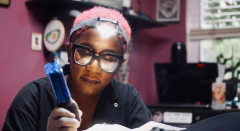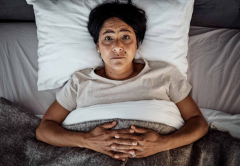
Still image of Malaika “Mecca” Burke tattooing.
Malaika “Mecca” Burke spotted a $3.9 billion market inefficiency hiding in plain sight: Black Americans get tattoos at the highest rate of any demographic—39% versus 32% of white Americans—yet less than 5% of tattoo shops are Black-owned. Burke didn’t come to New Orleans expecting to break barriers, but today, she’s the only Black woman tattoo shop owner and the second in its history. She arrived in 2006 as a college graduate with an animation degree, a painter’s eye and a volunteer’s heart, drawn by the aftermath of Hurricane Katrina and the call to help rebuild what the storm had torn apart.
“I was one of those do-goodery volunteers,” Burke said with characteristic directness, her hands never pausing in their work.
What began as a summer of service stretched into something more profound—a recognition that this layered, beautiful city offered something she’d never found in her native New Jersey: space to be authentically, unapologetically herself.
Still Image of Mecca’s Art.
“I love this city so much,” Burke reflected. “It’s fundamentally broken, but the people—this has probably been the most warmth and the most welcomed I’ve ever felt anywhere. There’s a lot of space to be an absolute weirdo, and I really appreciate that.”
This appreciation for New Orleans’ embrace of the unconventional runs deeper than personal comfort and shapes Burke’s entire approach to her craft and business. Her shop operates as something rare in the tattoo industry: a genuinely safe space where queer people, trans people and Black people can exist without constantly negotiating their presence or defending their worth.
“Lots of queer people, lots of trans people, lots of Black people” work in her shop, Burke noted—identities that “definitely would not have been comfortable in the tattoo industry” when she started 15 years ago.
The importance of this sanctuary cannot be overstated in an industry that Burke describes as “mean and unforgiving,” where “there’s no HR” and artists must “nut up and demand a space, because no one is going to give you anything.”
When Representation Meets the Bottom Line
The business case for Burke’s approach becomes clear in the demographics. While Asians have the lowest tattoo adoption at 14%, Burke’s core clientele, Black and Hispanic communities at 39% and 35% respectively, drive industry demand.
Burke’s path to ownership wasn’t ordained by family tradition or a traditionally artistic calling. She stumbled into tattooing through necessity and stubbornness, securing an apprenticeship because a shop owner “needed free labor.” The memory of her first tattoo remains visceral: sobbing inconsolably while a supervisor berated her for a minor mistake, yet pushing through to complete the work.
Mecca tattooing a client
“Maybe that was my first lesson,” Burke said. “You just gotta keep going even if you want to cry or even if you’re actively crying.”
That lesson would become the foundation for her attitude and approach to business—and the inspiration for her Magazine Street storefront, Hell or High Water. The phrase captures both her grit and New Orleans’ own survival story, an understanding that surviving in the tattoo industry demanded a militant commitment to occupying space that others would deny you. As a Black woman in predominantly white, male shops, Burke faced constant assumptions about her competence and belonging. Clients would bypass her expertise, seeking confirmation from male colleagues. The sexism was blatant; the racism more subtle but equally corrosive.
“In New Orleans, I feel like a lot of the time I got discounted, it was never because I was Black, only because I was a woman,” Burke said. It’s a distinction that speaks to the city’s particular racial dynamics, a place where Black culture forms the foundation of what makes New Orleans distinctive, even as that cultural appreciation doesn’t always translate into economic equity or social justice.
Close up tattoo b





